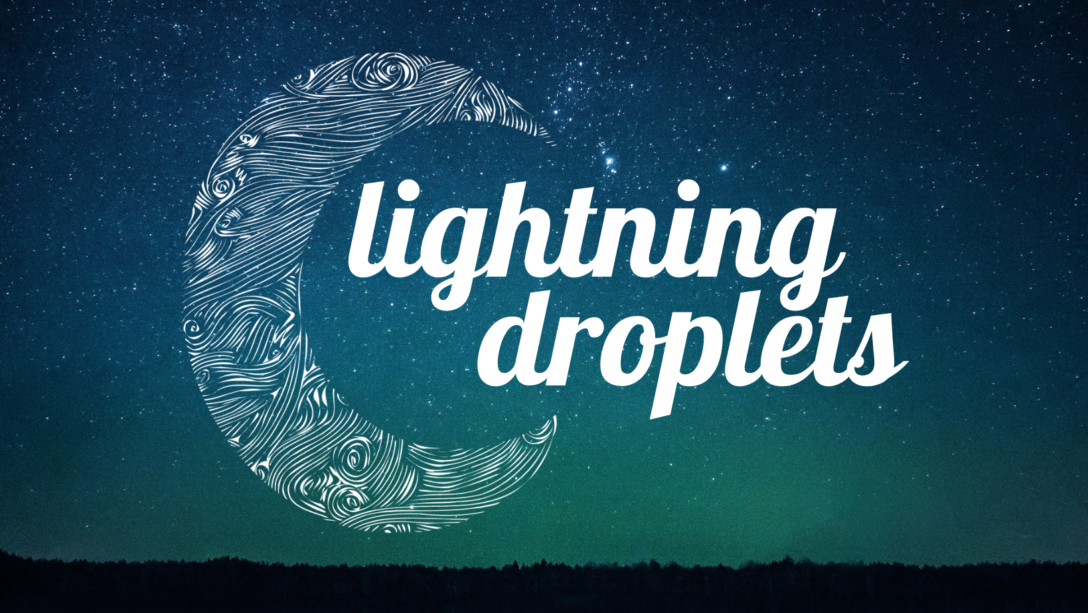Her story begins before the beginning. Before air and sea. Before light and dark. Before hot cosmic messes melting elements into mass. A partner without vowels. Syzygy to the first. A cross in a circle as if she is a bullseye. I know it is she who brings my inspiration. It is she who knows my powers and my weaknesses. It is she who has been forgotten.
It’s the eve of the primordial forest.
It begins with an army of frogs huddled around the very first puddle. The air remains still with anticipation, as it does in turbulent times. The hydrogen and helium swirl in hot messes all around, fusing into heavier elements and lighting the otherwise primeval void. And still, the puddle does not move. Their toes twitch, but they do not croak. It seems they are waiting for something to happen. They make eye contact with each other in anticipation. They look in to it, trying to find their own reflections, to make sense of the sludge.
But you already know this story. You do not need to read these words. They are only signs which will direct you to the place in your mind where this story already sits. There are infinite paths to get there, and these signs may be misleading, crumbling under the weight of time before becoming paths themselves. They may lean crookedly, pointing in ambiguous directions, so you may want to stop reading and find another, more direct, reliable way. Or you could continue.
It’s more correct to say that the army of frogs is actually a mold. It grows green around the edges of the puddle, tapering off, but having no edge itself. It is not one. It is not many. It both grows and does not move, like a tree rooted in cement. It spasms in the hush. And still, it watches the puddle, which is suddenly muddled.
And then the mold, the frogs, the army, the void: it sees her in the puddle. Despite the cosmic lightning storm spiraling around it, she is the most beautiful thing they, it, the frogs, the mold, has ever seen. She shimmers in a pool of water that refuses to show the reflection of the frogs, or the reflection of the universal birth exploding stars above. She is perfect, Incorruptibility. And just as quickly she is gone.
She is the daughter of knowledge. Passion and fire. Life. Incorruptibility. Knowledge. She is daughter to all of these, and they reside within her.
It’s a story that’s easier to tell in tiles. The texts are spotty and it’s long past. Really, the true story sits somewhere in the shadow of each of our minds. It’s the reflection in the sea of primordial memory that’s just a bit too hazy for us to see into. A bit too muddled. A muddled puddle surrounded by a mold of frogs croaking somewhere just below where memories lie.




 Amenhothep. That was what he had been called. Named after his father. But even his father regretted that. He was clearly not his father’s son. He came out misshapen, with a head too big and the shoulders of a woman. Not fit to be a king. Not even fit to be a prince. He didn’t hope to be invited anymore. He didn’t ask to go to ceremonies or carvings. Family sculptures were for the princely children. Siblings who came out looking normal enough, generic enough that any sculptor could make them beautiful, could make them look like a pharaoh should. Broad shoulders. Small waists. Perfect faces just waiting to be framed by royal adornments. His was truly a face only a mother could love.
Amenhothep. That was what he had been called. Named after his father. But even his father regretted that. He was clearly not his father’s son. He came out misshapen, with a head too big and the shoulders of a woman. Not fit to be a king. Not even fit to be a prince. He didn’t hope to be invited anymore. He didn’t ask to go to ceremonies or carvings. Family sculptures were for the princely children. Siblings who came out looking normal enough, generic enough that any sculptor could make them beautiful, could make them look like a pharaoh should. Broad shoulders. Small waists. Perfect faces just waiting to be framed by royal adornments. His was truly a face only a mother could love. Even when history is written in stone, it is re-written. This is the nature of the story. Suns and hawks and buffaloes are erased, scratched over to be reused in the temples of the future. Reunderstood. Re-envisaged. Repostulated. This is how Akhenaten was lost, struck from the roll of the pharaohs, a distant memory of a monotheistic heretic, a madman with only one god. He built cities and temples and sculptures of stone and gold and they were quietly erased in the span of a generation. Father of history’s most famous pharaoh, the first individual, founder of world religions and yet … forgotten.
Even when history is written in stone, it is re-written. This is the nature of the story. Suns and hawks and buffaloes are erased, scratched over to be reused in the temples of the future. Reunderstood. Re-envisaged. Repostulated. This is how Akhenaten was lost, struck from the roll of the pharaohs, a distant memory of a monotheistic heretic, a madman with only one god. He built cities and temples and sculptures of stone and gold and they were quietly erased in the span of a generation. Father of history’s most famous pharaoh, the first individual, founder of world religions and yet … forgotten.
